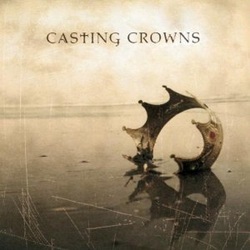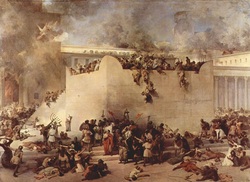 image courtesy of basileiachurch.com The Meaning of the Term Kingdom (βασιλεία) in Matthew's Gospel A Greek word study to identify the lexical range and usage to better understand what Matthew, and by extension Jesus, had in mind when he proclaims the "Kingdom of Heaven."
0 Comments
 Wonder where the band's name originated? Craig Blomberg's Degrees of Heavenly Reward in the Kingdom of Heaven? in terms of Dogmas, Doctrines, Distinctives, and Details.* Dogmas. Blomberg does a fabulous job of revealing the dangers that “heavenly rewards” poses to the essentials of Christianity. He not only asserts salvation by faith in Christ alone (159) in this life (172) but also that Heaven will not open for those who “flagrantly repudiate Christ without subsequent repentance” (163). Blomberg rightly warns that the threat is not contingent upon whether one believes in “heavenly rewards,” (165), but that one's profession of faith may prove to be entirely vacuous, thus excluding them from Heaven because they thought that the lack of fruit in their lives indicated the absence of future rewards, not the absence of their salvation (172). “Saving faith does over time lead to a visible transformation in lifestyle and to growth in holiness” (172) for a tree is recognized by its fruit! The “prosperity gospel” is a false gospel, for health and wealth supplant Christ crucified.  Isaiah 6:1 (ESV) In the year that King Uzziah died I saw the Lord sitting upon a throne, high and lifted up; and the train of his robe filled the temple. (6:4) And the foundations of the thresholds shook at the voice of him who called, and the house was filled with smoke. (6:5) And I said: "Woe is me! For I am lost; for I am a man of unclean lips, and I dwell in the midst of a people of unclean lips; for my eyes have seen the King, the LORD of hosts!" (6:8) And I heard the voice of the Lord saying, "Whom shall I send, and who will go for us?" Then I said, "Here I am! Send me."  "And everyone who has left houses or brothers or sisters or father or mother or children or lands, for my name's sake, will receive a hundredfold and will inherit eternal life. But many who are first will be last, and the last first. For the kingdom of heaven is like...” (Matthew 19:29-20:1a) It has become common knowledge that God will bless people 100 times over (or with “100% interest”) for what they sacrifice for the sake of the Kingdom. However, because this parable has been lifted from the context of Jesus' larger teaching (since Jesus is the most misquoted person in history), people have used it to support their worldly inspired visions of a material heaven.  “For everyone who exalts himself will be humbled, and he who humbles himself will be exalted.” (Luke 14:11) At a dinner where Pharisees were scrambling for the “places of honor at the table” Jesus told a parable instructing them to take humble seats, for if the host asks them to move to a higher seat they will be exalted and if the host asks them to move to a lower seat they will be shamed before everyone. While this may come across as a sly way to get ahead by practicing a false humility in order for the host to publicly “indicate your intrinsic superiority” (Elwell, 825), v11 shows that Jesus was clearly illustrating the Kingdom law of “humility before honor,” which demands “self-humbling” and the elevation of others (Howell, 237).  “To seek” God means: total unbridled commitment, blatantly obssessive pursuit, unreserved loyalty, and unashamed devotion. In a seemingly contradictory way, we are to “enslave” ourselves to God - not at our expense, but to our profit. By giving up everything to find God, we gain everything only to find that what we relinquished we could not keep and what we aquired we cannot lose. We sell what is worthless in order to acquire that which cannot be valued. We give up our lives in pursuit of God and in return we not only find Him who we sought, but are given a life worth living and, far better, life eternal. Thus, by whatever means, through His word, through His gifts, through His presence, we are to commit all our energies to restoration with our Father. In short, if we make God our sole desire and seek Him earnestly with all our hearts, then He will give Himself to us and we shall be rewarded with that which we seek. The Reforms of Kings Asa, Jehoshaphat, Hezekiah, and Josiah  Francesco Hayez, Destruction of the Temple Entropy was one consequence of the fall, dooming all creation to a slow decay into chaos. Even the loyalty and gratitude of the people the Lord called out of the fray and into his kingdom are not exempt from the effects of entropy. This decay is seen as their faith drifts from God's core tenants through worldly desires of control, convenience, and compromise. To reverse the drift, The Lord periodically raises up radicals who call for reform, to end unorthodox practices and return to a pure relationship of faith. This inevitable cycle is a consistent theme within the history of the church, with clear biblical foundations as seen throughout the Kings of Judah. During the divided monarchy of Israel, the drift that began gradually during the golden age of King Solomon jumped drastically with the northern kingdom of Israel's political split sanctioning blatant compromise in the name of convenience to retain control of the people. While the southern kingdom of Judah retained the core faith, it suffered severe entropy during the reigns of twelve apostate kings influenced by surrounding nations. Of all twenty kings of Judah, eight are remembered for their obedience to God, and of these only four enacted reforms. Through the four reigns of kings Asa, Jehoshaphat, Hezekiah, and Josiah, we can learn what influenced their actions, how they initiated reforms, and what foolish errors they made to interpret the effectiveness of their efforts. By studying their lives we can avoid repeating their mistakes in the cyclical battle against entropy while we fulfill the great commission today.  Lead with a towel When he [Jesus] had finished washing their feet, he put on his clothes and returned to his place. “Do you understand what I have done for you?” he asked them. “You call me ‘Teacher’ and ‘Lord,’ and rightly so, for that is what I am. Now that I, your Lord and Teacher, have washed your feet, you also should wash one another’s feet. I have set you an example that you should do as I have done for you. Very truly I tell you, no servant is greater than his master, nor is a messenger greater than the one who sent him. Now that you know these things, you will be blessed if you do them. (John 13:12-17) During the Upper Room Discourse (the Last Supper), Jesus gave his disciples final teachings to to prepare them for leadership in his physical* absence. Here Jesus delivers one of the most memorable lessons on humility and leadership. God incarnate took the position of a servant/slave and washed the gritty sandaled feet of 12 sweaty men who'd been walking all day. In Luke's account of the Last Supper (Luke 22:7-38) he tells that once again the 12 disciples began to dispute who among them was to be considered the greatest (v24). Jesus then spells out the upside down kingdom again (just as in Matthew 18:1-9) by revealing that the one who rules is the one who serves, just as Christ served them.  One positive and one negative event and the lesson it teaches from the history of Christianity. How do they apply to God's mission today? Sadly Tertullian's famous quote that “the blood of the martyrs is the seed of the church” is not always true. In fulfilling Christ's Great Commission, the apostles used not only the Roman roads to reach Europe with the gospel, but also the Silk roads to reach Asia and Africa. Tradition states that the apostle Thomas discipled Christians who reached Persia, Arabia, India, and China. Their efforts spawned the first Christian nation of Armenia, one of the first church buildings in Dura-Europa, and even a theological missionary school in Nisibis (Persia)! By 500 A.D. half of all Christians lived in the non-west, but trials and persecutions virtually wiped them from history. |
AuthorBrett Yardley: Categories
All
Archives
January 2019
|

